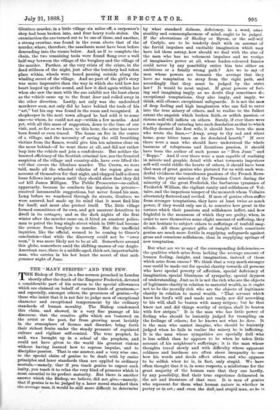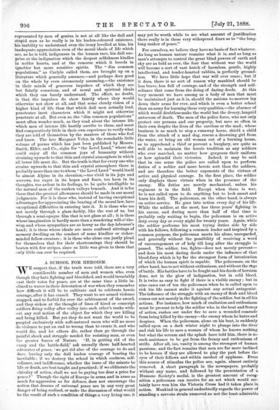THE " MANY STRIPES " AND THE FEW. HE Bishop
of Derry, in a fine sermon preached in London -I- shortly after the death of the Emperor Frederick, devoted a considerable part of his sermon to the special allowances which are claimed on behalf of various kinds of greatness,— and especially, amongst others, the greatness of genius,—by those who insist that it is not fair to judge men of exceptional character and exceptional temperament by the ordinary standards of human morality. The Bishop condemned this claim, and showed, in a very fine passage of his discourse, that the creative gifts which are bestowed on the artist or the poet, far from growing most lavishly in the atmosphere of licence and disorder, bring forth their richest fruits under the steady pressure of regulated culture and vigilant self-control. The true prophet, he said, was brought up in a school of the prophets, and could not have given to the world his greatest visions without having learned how to repress impulse, and to discipline passion. That is one answer, and a very wise one, to the special claim of genius to be dealt with by easier principles and laxer standards than are applied to ordinary mortals,—namely, that if you teach genius to expect such lenity, you teach it to relax the very kind of pressure which is most essential to its perfect maturity. But there is another answer which the Bishop, we believe, did not give,—namely, that if genius is to be judged by a laxer moral standard than the average man, it would be still more difficult to determine
by what standard dulness, deficiency, in a word, utter sterility and commonplaceness of mind, ought to be judged. If the aberrations of Shelley or Byron, or the self-will of Carlyle, are to be tenderly dealt with on account of the fervid impulses and excitable imagination which may
have led them astray, how should we deal with the sins of the man who has no vehement impulses and no vestige of imaginative power at all, whose leaden-coloured fancies ()mid never by any possibility entice him into either an ambitious or a fatally wrong path P Are we to say of men whose powers are beneath the average that they have no temptation to stray from the right path, and accordingly that they must be judged by the strict law P It would be most unjust. If great powers of feel- ing and imagining imply, as no doubt they sometimes do, exceptional temptations, they also imply, and imply, we think, still oftener, exceptional safeguards. It is not the man of deep feeling and high imagination who can fail to enter into the true misery of others, and to realise to the fullest extent the anguish which broken faith, or selfish passion, or riotous self-will inflicts on others. Surely, if ever there were a man capable of entering into such desolation as that to which Shelley doomed his first wife, it should have been the man who wrote the lines,—" Away, away to thy sad and silent home, pour bitter tears on its desolated hearth." If ever there were a man who should have understood the whole baseness of voluptuous and licentious passion, it should have been the author of such poems as " Don Juan " and " Beppo." And if ever there were a man capable Of realising in minute and graphic detail with what torments imperious self-will could riddle the hearts of others, it should have been that man of great genius who pictured for us with such won- derful vividness the tumultuous passions of the French Revo- lution, the petty miseries of the Prussian Court during -the minority of the great Frederick, the barbarous tyrannies of Frederick William, the vigilant vanity and selfishness of Vol- taire, and the imperious temper of the monarch whom Voltaire alternately flattered and reviled. If men of genius often suffer from stronger temptations, they have at least twice as much power, if they would only use it, to conceive how great is the torture which their passions and selfishness inflict, and how frightful is the meanness of which they are guilty, when, in order to save themselves some slight amount of suffering, they do not hesitate to subject others to sufferings of tenfold mag- nitude. All those greater gifts of insight which constitute genius are much more fertile in supplying safeguards against gross and conscious selfishness, than in supplying springs of new temptation.
But what are we to say of the corresponding deficiencies,— the qualities which arise from lacking the average amount of human feeling, insight, and imagination, instead of those which arise from excess P We think that a very much stronger case could be made out for special charity towards all persons who have special poverty of affection, special deficiency of imagination, special bluntness of sympathy, special dryness of understanding. Just as it is not the rich who are the objects of legitimate charity in relation to material wealth, so it ought not to be the morally rich who are the objects of legitimate charity in relation to moral wealth. " That servant which knew his lord's will and made not ready, nor did according to his will, shall be beaten with many stripes ; but he that knew not and did things worthy of stripes, shall be beaten with few stripes." It is the man who has little power of feeling who should be leniently judged for trampling on the feelings of others ; for he knows not what he does. It is the man who cannot imagine, who should be leniently judged when he fails to realise the misery he is inflicting. It is the man whose sympathies are specially dull .who is less selfish than he appears to be when he takes little account of his neighbour's sufferings ; it is the man whose thoughts travel slowly and with difficulty whose apparent coldness and hardness are often sheer incapacity to - see how his words and deeds affect others, and who appears to be selfish when he is, in fact, only stupid. We have often thought that it is, in some respects, a misfortune for the great majority of the human race that they can hardly, by any possibility, find their true experience delineated in the art and literature of that race. It is men of genius who represent for them what human nature is, whether in poetry or in art ; and even the dullrand stupid man, as he is represented by men of genius, is not at all like the dull and stupid man as he really is in his leaden-coloured existence, his inability to understand even the irony levelled at him, his inadequate appreciation even of the moral ideals of life which are, as he is told, indigenous in the human race, his dull sur- prise at the indignation which the deepest selfishness kindles in nobler hearts, and at the remorse .which it breeds in ignobler but more sensitive spirits. The " dim common populations," as Carlyle called them, are brought up on a literature which generally assumes,—and perhaps does good on the whole by even erroneously assuming,—the g,—the existence in their minds of generous impulses of which they are but faintly conscious, and of moral and spiritual ideals which they can barely understand. The effect, no doubt, is that the impulses do show faintly where they would otherwise not show at all, and that some cloudy vision of a higher kind of life than that which dull men actually lead, penetrates inert characters which it might not otherwise -penetrate at all. But even so, the "dim common populations" must often wonder much, as they read about the intense life which men of intense life hastily ascribe to them, and must find comparatively little in their own experience to verify what they are told of themselves by the masters of those who feel and know. The late Margaret Veley, in the remakable little volume of poems which has just been published by Messrs. Smith, Elder, and Co., sighs for "the Level Land," where she could enjoy all the common joys of humanity without straining up wards to that thin and crystal atmosphere in which all lower life must die. But the troth is that for every one who strains upwards to that thin and crystal atmosphere there is probably more than one to whom " the Level Land " would itself be almost Alpine in its elevation,—too vivid in its joys and sorrows, too eager in its hopes and fears, too keen in its thoughts, too ardent in its feelings, to be quite intelligible to the natural man of the sunken valleys beneath. And it is for these that the greatest allowances should be made in our moral judgments. For it is these who, instead of having exceptional advantages for appreciating the bearing of the moral law, have -exceptional difficulties in entering into it. It is these who see -not merely through a glass darkly, like the rest of us, but through a semi-opaque film that is not glass at all; it is these whose imagination is hardly more than a wandering will-o'-the- wisp, and whose sympathies are as horny as the day-labourer's hand ; it is these whose ideals are mere confused stirrings of memory dwelling on the conduct of some kindlier or richer- minded fellow-creature ; it is these who alone can justly plead for themselves that for their shortcomings they should be beaten with few stripes, since so little was given to them that only little can ever be required.



































 Previous page
Previous page